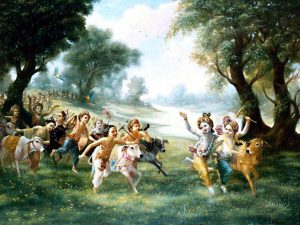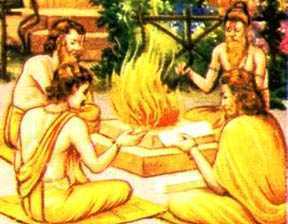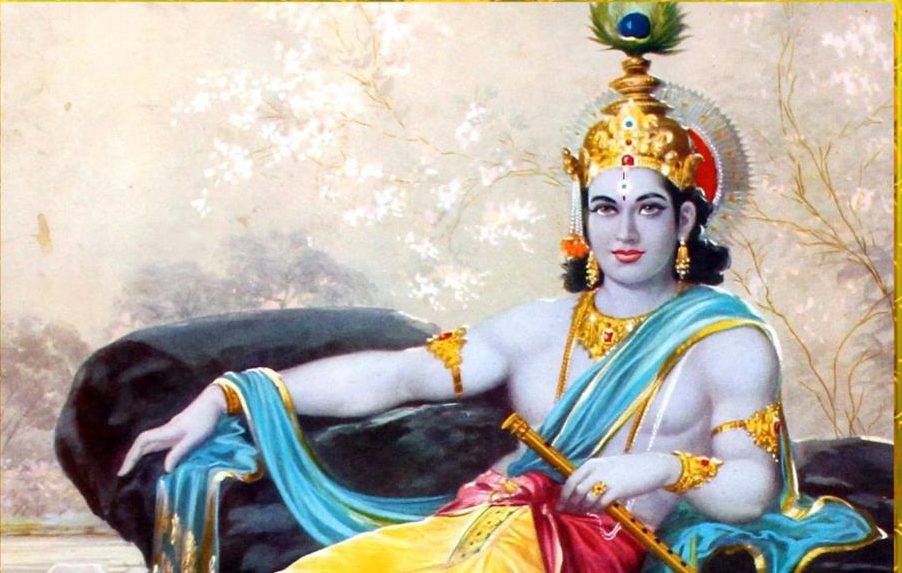Nilanjana retells a tale of seva (unconditional service) that Krishna narrated, from the Bhagavatam. He cites the examples of a tree and wives of wise men. Read more in the weekly column, exclusively in Different Truths.
Sukha had paused for a while before narrating the next story of Krishna. Parikshit followed his gaze that had rested on a huge tree nearby. He was curious after a while. He asked, “What is it about the tree that so interests you?”
Sukha answered, “Krishna was a prankster but at times he really spoke words of wisdom. One day, when he and his friends were roaming around in the forest to play, he suddenly began reflecting. He looked at the trees. He admired their grace. Their interlaced branches and leaves provide a natural umbrella for the tired who are looking for shelter. Without any complaint, they bear the intensity of summer, the violence  of the rains and storms and the chilling fire of the frost. They try their level best to help people from the fury of nature. They nurture people and provide leaves, flower, fruit, shade, root, and bark. They are in use even after they die. They live only to provide unconditional service to others. All sacred texts say that one should be of use to others – the trees exemplify more sincerely than human beings.”
of the rains and storms and the chilling fire of the frost. They try their level best to help people from the fury of nature. They nurture people and provide leaves, flower, fruit, shade, root, and bark. They are in use even after they die. They live only to provide unconditional service to others. All sacred texts say that one should be of use to others – the trees exemplify more sincerely than human beings.”
“That is so true,” Parikshit agreed.
Sukha went back to the next story, “While an emotional Krishna went on appreciating the selfless service that is provided by the trees, his playmates were getting fidgety. That particular day they had not carried any lunch. As they became hungry, they asked Krishna to help them. Krishna guided them to a spot nearby where some Brahmins (priests) well versed in Vedas were performing rituals and prayers. He asked his  friends to go there and ask for some food since no ritual can be complete in the absence of food. The young cowherds rushed to the holy spot. They saw a few Brahmins who had completed one set of rituals and were waiting to perform the next one. The hungry cowherds asked for food. The Brahmins looked at them silently and did not budge. The boys asked a few more times and even mentioned that Krishna’s name. But the Brahmins did not care. They were performing these rites for their own moksha (liberation) and were not interested in helping others out. Their ego, which they had acquired owing to the pride of their rigorous spiritual practices, had perhaps made them self-centered. Moreover, they also thought that they were very wise. They did not pay any heed to these boys and continued with their rituals.
friends to go there and ask for some food since no ritual can be complete in the absence of food. The young cowherds rushed to the holy spot. They saw a few Brahmins who had completed one set of rituals and were waiting to perform the next one. The hungry cowherds asked for food. The Brahmins looked at them silently and did not budge. The boys asked a few more times and even mentioned that Krishna’s name. But the Brahmins did not care. They were performing these rites for their own moksha (liberation) and were not interested in helping others out. Their ego, which they had acquired owing to the pride of their rigorous spiritual practices, had perhaps made them self-centered. Moreover, they also thought that they were very wise. They did not pay any heed to these boys and continued with their rituals.
“Meanwhile, the boys came back to Krishna empty-handed. Krishna laughed, “Look, a beggar may have to go through such moments of humiliation. But never mind. Go to the wife of these men and they will definitely not disappoint you…”
[To be continued]
Footnote: Srimad Bhagavatam is often called the Bhagavad Purana. Authored by Ved Vyasa, the stories are about the various avatars (incarnations) of Lord Vishnu, also known as Narayana. These stories are narrated by Sukhadeva to King Parikshit.
©Nilanjana Dey
Photos from the Internet
#Krishna #VedVyasa #BhagavadPurana #SrimadBhagavatam #Narayana #Seva #UnconditionalService #Sukha #Moksha #MythAndMythology #DifferentTruths






 By
By


 By
By